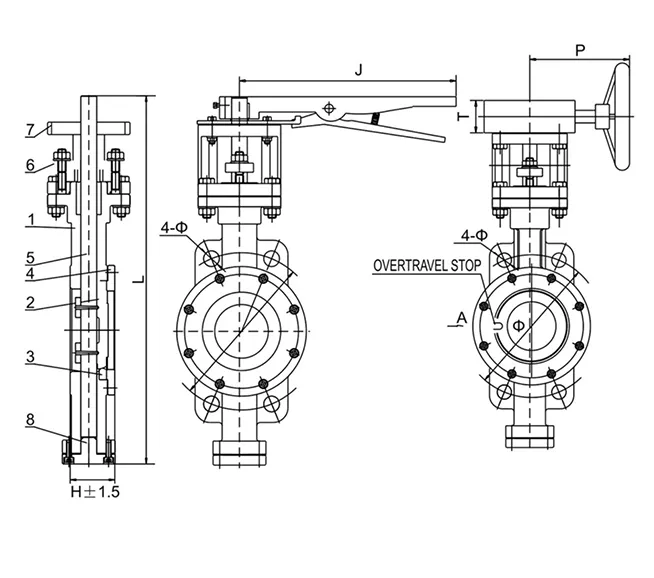10 月 . 13, 2024 02:23 Back to list
knife gate valve
Understanding Knife Gate Valves A Comprehensive Overview
Knife gate valves are specialized devices used in various industrial applications for regulating the flow of liquids and slurries. Their distinct design and functionality make them particularly suitable for harsh environments, where traditional valve types may struggle. This article explores the features, applications, advantages, and considerations of knife gate valves, illuminating their vital role in modern industrial systems.
Design Features of Knife Gate Valves
The knife gate valve gets its name from the sharp-edged blade (or knife) that cuts through the medium. This design is effective in managing flow, especially when dealing with suspended solids or slurries. The valve typically comprises a gate or blade that slides vertically within a guide, allowing for minimal obstruction when in the open position. The following are some key design features
1. Material Construction Knife gate valves can be made from various materials, including stainless steel, carbon steel, and various alloys, ensuring compatibility with different media types and environmental conditions.
2. Sealing Mechanism The sealing mechanism can be a simple elastomer gasket or a more robust metal-to-metal seal, providing versatility depending on the desired tightness and pressure ratings.
3. Actuation These valves can be manually operated using a handwheel or automated with electric or pneumatic actuators, facilitating remote operation and enhancing operational efficiency.
Applications of Knife Gate Valves
Knife gate valves are widely utilized across numerous industries due to their unique capabilities
- Pulp and Paper Industry In processes involving pulp slurries, knife gate valves are indispensable for controlling flow and isolating various sections of the system.
- Mining and Mineral Processing The durability and ability to handle thick slurries make knife gate valves a standard choice in mining operations for regulating the flow of materials
.- Wastewater Treatment Their ability to handle solids makes these valves essential in wastewater management and treatment facilities, where they manage the flow of sludge.
- Food Processing In the food industry, sanitary designs of knife gate valves are used to control the flow of liquids without contamination, adhering to hygienic standards.
knife gate valve

Advantages of Knife Gate Valves
1. Effective Flow Control The sharp blade design allows for precise control over flow, easily handling viscous and high-solid-content fluids.
2. Low Maintenance Knife gate valves typically have fewer moving parts than traditional valves, leading to lower maintenance costs and downtime.
3. Space Efficiency Their compact design makes them suitable for installations where space is limited while still providing reliable service.
4. Versatility Available in different sizes and configurations, knife gate valves can be customized for specific applications, making them adaptable to various industrial settings.
Considerations for Selection
When selecting a knife gate valve, several key factors should be taken into account
1. Media Type Consider the properties of the material being controlled, including viscosity, temperature, and chemical compatibility, to select the appropriate construction material.
2. Pressure and Temperature Ratings Ensure that the valve's ratings align with the operational conditions of the system to prevent leaks and ensure safety.
3. Installation Space Gauge the available space for installation to select a valve that fits without compromising accessibility for maintenance.
4. Actuation Method Determine whether manual or automated operation is more suited to your needs, considering factors like efficiency, control, and labor costs.
Conclusion
Knife gate valves play a critical role in various industrial applications, providing efficient flow control in systems that handle challenging media. Their unique design, coupled with numerous advantages, makes them an ideal choice for many sectors, from pulp and paper to wastewater treatment. By understanding their features, applications, and selection considerations, industries can optimize processes, ensuring safety and efficiency in operations. As technology advances, knife gate valves continue to evolve, promising even greater performance and reliability for the future.
Share
-
Understanding the Differences Between Wafer Type Butterfly Valve and Lugged Butterfly ValveNewsOct.25,2024
-
The Efficiency of Wafer Type Butterfly Valve and Lugged Butterfly ValveNewsOct.25,2024
-
The Ultimate Guide to Industrial Swing Check Valve: Performance, Installation, and MaintenanceNewsOct.25,2024
-
Superior Performance with Industrial Swing Check Valve: The Essential Valve for Any SystemNewsOct.25,2024
-
Industrial Swing Check Valve: The Ideal Solution for Flow ControlNewsOct.25,2024
-
You Need to Know About Industrial Swing Check Valve: Functionality, Scope, and PerformanceNewsOct.25,2024